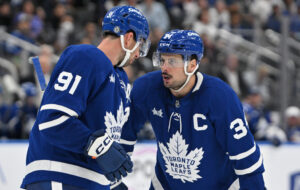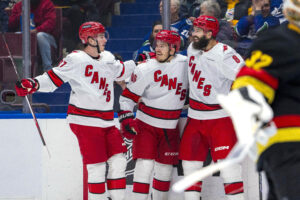The Missing Rings is a series looking at some of the best teams in NHL history to not win the Stanley Cup. Whether they lose in the first round or game seven of the finals, these great teams have been forgotten because they could not win the big one. For the next installment, the 1995-96 Detroit Red Wings are the focus.
The Missing Rings: 1995-96 Detroit Red Wings
1994-95 Season
The 1994-95 season was marred by a work stoppage that wiped out nearly half the season. When the games started back in January of 1995, teams played a reduced 48 game schedule. The Red Wings, for their part, had begun to establish themselves as an elite team in the NHL. They had won the Norris/Central Division two of the last three seasons. They also put up back to back seasons of at least 100 points. Despite back to back strong seasons, the Red Wings were upset in the first round by the Toronto Maple Leafs in 1994 and the San Jose Sharks in 1995. The Red Wings needed to take the next step.
In the shortened season, Detroit paced the league. They amassed a 33-11-4 record and 70 points good for the Presidents Trophy. Paul Coffey led the Wings in scoring with 58 points also good for seventh in the league. Coffey also won his third Norris Trophy as well. Detroit also got strong seasons from Sergei Fedorov, Keith Primeau, Dino Ciccarelli, Ray Sheppard, and Steve Yzerman. On the back end, Coffey was joined by Nicklas Lidstrom, Viacheslav Fetisov and Vladimir Konstantinov. Detroit was poised for a deep run.
They had a deep playoff run. First, they made quick work of their Western Conference rivals, going 12-2 against Dallas, San Jose, and Chicago. The Red Wings outscored their opponents 54-28 in the 14 games. The Wings were the heavy favorites in the Stanley Cup final against the New Jersey Devils. Unfortunately, Jacques Lemaire‘s Devils used the Neutral Zone Trap to slow the high powered Red Wings down. The Devils only conceded seven goals to Detroit in the series. The Devils won in a sweep.
1995-96 Season
Despite the ultimate disappointment of losing in the Cup final, Detroit has seen some growth and progression. While a demoralizing loss can be hard to recover from, head coach Scotty Bowman had the Wings back on the path to glory. The Wings absolutely dominated the NHL in 1995-96. They set the record for most wins by a team with 62. Their 131 points were the most since the 1976-77 Montreal Canadiens (also coached by Bowman). The Wings were runaway winners of the Presidents Trophy. Their next closes rival was the Colorado Avalanche with 104 points.
In October, the Wings acquired Igor Larionov from the Sharks. With Larionov in the fold, Bowman deployed a five-man Russian line that wreaked havoc on the NHL. Knowing the Russian style of play stressed five-man units over lines, Bowman, at the suggestion of Larionov, grouped the players together so they could play a more “Russian” style that NHL teams were not used to seeing. Larionov centered a line with Federov and Viatcheslav Kozlov with Viatcheslav Fetisov and Vladimir Konstantinov playing defense.
The 1995-96 Detroit Red Wings were led by the usual cast of characters. Sergei Federov led the team in scoring with 107 points. Yzerman, Kozlov, Larionov, Primeau, Ciccarelli, Coffey and Lidstrom all had good seasons. The Wings were backstopped by the goaltending duo of Chris Osgood and Mike Vernon.
A game of note during this historic season was December 2nd, 1995. The Red Wings pounded the Montreal Canadiens, in the Forum, 11-1. The Wings put nine goals past Patrick Roy which ultimately led to his demanding a trade out of Montreal. Roy was traded to Colorado December 5th (more on that later).
What Went Wrong
The Wings were expected to roll through the Stanley Cup Playoffs. Perhaps it was an early warning sign that something was not right when they needed six games to dispatch the lowly Winnipeg Jets. They then needed an epic game seven double-overtime goal from Yzerman to defeat the St. Louis Blues to reach the Western Conference Finals.
In the Western Conference Finals, Detroit would meet the Colorado Avalanche. The Avs were no slouch to be sure, but they also had a bit of an ace up their sleeve. The previously embarrassed Partick Roy was now their goalie and set to avenge the beatdown from December.
Colorado took the first two games in Detroit, 3-2 OT and 3-0. Roy was spectacular making 64 saves in the two wins. Detroit got back in the series with a 6-4 win in Denver. Colorado seized control of the series with a 4-2 win in game four. Facing elimination, Detroit rallied for a 5-2 win to stave off elimination. Game six, back in Colorado Patrick Roy made 23 saves in a 4-1 Avs win to clinch the series.
Rivalry Born
The series is the flashpoint of the Red Wings-Avalanche rivalry that lasted until the early 2000s. At the center of the feud was Claude Lemieux. Always a chippy player, Lemieux was a thorn in the Red Wings side in the 1995 Stanley Cup Finals and was at it again in the 1996 Western Conference Finals. Game 3 saw the feud ignite when Slava Kozlov slammed Adam Foote‘s face into the glass. In retaliation, Lemieux sucker-punched Kozlov in later in the game.
Game four the rivalry was set ablaze when Lemieux hit Chris Draper from behind near the Wings bench. Draper hit the boards face first and received several injuries. The rivalry would explode over the next few seasons resulting in several line brawls, including three separate goalie fights. The rivalry defined the NHL between 1996-2003. The Wings and Avs would also combine for five Stanley Cups during that time.
Aftermath
The immediate aftermath saw the Avalanche win their first-ever Stanley Cup. The Wings were again left wanting as the team had not won a Cup since 1955. The following season Detroit would slip off their perch atop the Central Division. Despite this, the Wings would exercise their playoff demons and win the Stanley Cup in 1997. They would repeat as champions in 1998. Detroit would again raise the Cup in 2002 in what would be the end of the Bowman era for the Wings. Falling short in 1995-96 did not slow the Wings down or cripple them psychologically. Still, the 1995-96 Detroit Red Wings are one of, if not the, best team to not win the Stanley Cup.






